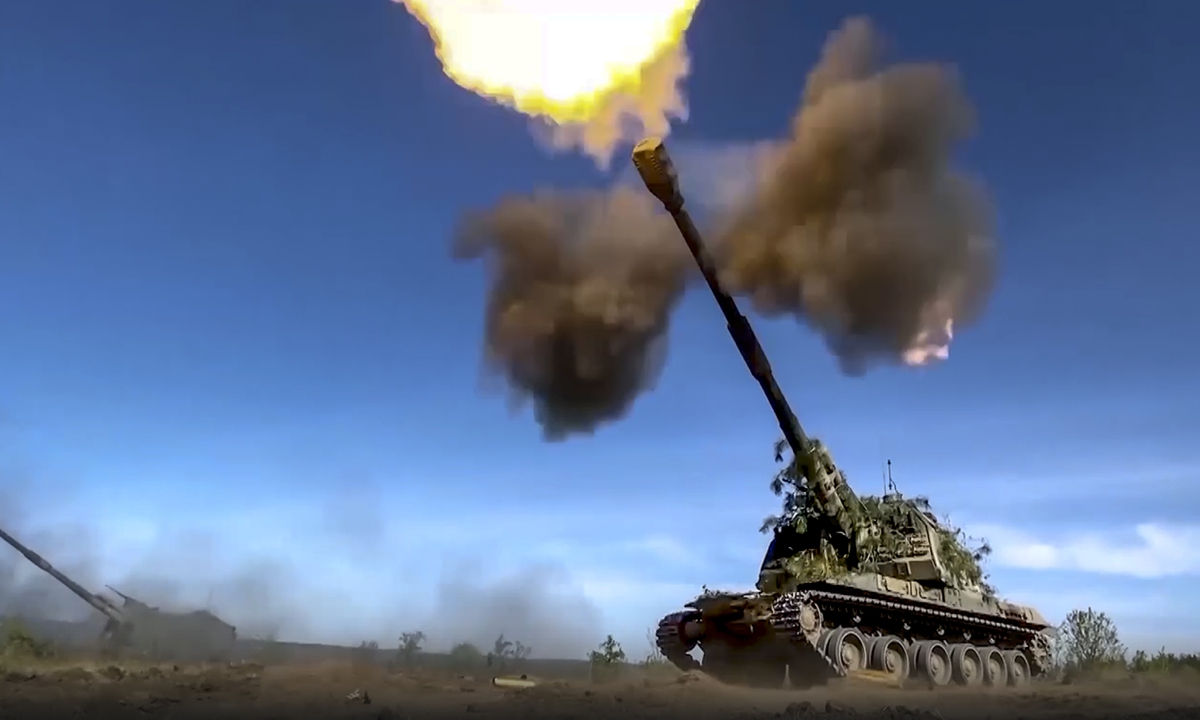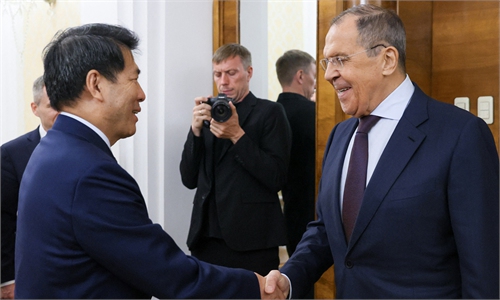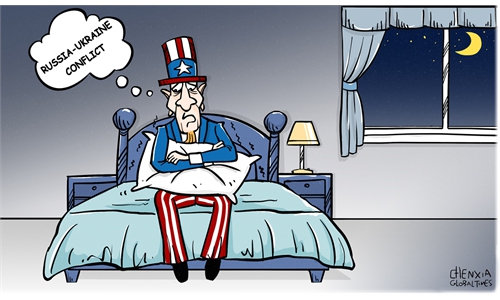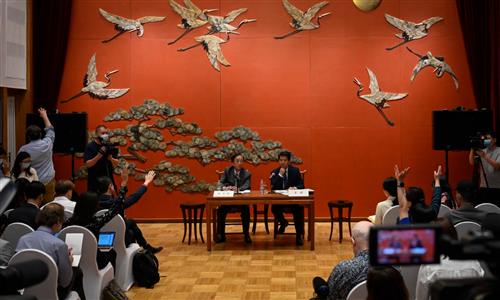
Photo taken from a video released by Russian Defense Ministry Press Service on June 5, 2023 shows a Russian self-propelled gun firing toward Ukrainian positions at an undisclosed location. Photo: VCG
Russia claimed that a recent offensive launched by the Ukrainian military has been thwarted by Russian forces, while Kiev remained low-profile on its operation. Chinese experts on Monday said that Ukrainian troops are unlikely to bring significant change to the current situation as they have suffered great losses in the previous battle in Bakhmut, and the Western supplies can't effectively help them to achieve major victory against Russia but will only be able to prolong the conflict and maintain the current deadlock on battle grounds.
This makes the conflict mediation efforts by the international community increasingly difficult, and China will uphold its objective and fair stance in future diplomatic efforts, analysts said, stressing that the peace process should include both Russia and Ukraine rather than exclude and isolate anyone of them, and the issues between them should be solved step by step via negotiations based on pragmatic principle, rather than merely stick to military measures with unrealistic plan that causes endless bloodshed.
Hard to break deadlock
According to TASS on Monday, the Ukrainian armed forces failed to achieve success in a large-scale offensive on five front sectors in the south Donetsk area, official spokesman of the Russian Defense Ministry Lieutenant General Igor Konashenkov said.
"The adversary launched a large-scale offensive from the morning of June 4 (Sunday) on five sectors of the front in the south Donetsk area by bringing into action 23rd and 31st mechanized brigades from strategic reserves of the Ukrainian armed forces with support from other military units and teams," the spokesman said. "The adversary's objective was to break through our defense on the most vulnerable front sector, in its opinion. The enemy failed to perform its tasks and had no success."
The adversary used six mechanized battalions and two tank battalions, the defense ministry's spokesman said. "As a result of skilled and sophisticated action of the Battlegroup East, the Ukrainian armed forces lost more than 250 persons, sixteen tanks, three mechanized infantry combat vehicles and 21 combat armored vehicles," Konashenkov stressed. The Russian spokesperson particularly noted that Chief of General Staff Army General Valery Gerasimov was at one of the frontline command posts in this area.
On Monday, Ukraine's military said it had no information about a major offensive in the region.
"We do not have such information and we do not comment on any kind of fake," a Ukrainian army spokesperson told Reuters.
Chinese military experts said the information released by the Russian side such as combat details and latest activity of senior military commanders showed that Moscow is getting more and more confident in terms of intelligence while Ukraine is keeping a low-profile about the development of its operation. After the Russian troops reportedly occupied most of Bakhmut last month with only a small strip under Ukrainian control, Ukraine suffered great casualties in the tough fight, making it really difficult to launch an effective major offensive to push back Russian forces in the short term.
Zhang Hong, an associate research fellow at the Institute of Russian, Eastern European and Central Asian Studies of the Chinese Academy of Social Sciences, told the Global Times on Monday that it's really hard for both sides to realize new military breakthrough at the moment.
"After a series of fights since more than a year ago, the two sides have built many fortifications alongside the long control line, making them have to pay very high price in every step they try to push forward against each other. This kind of deadlock is a problem, especially for Kiev, as the Western weapon supplies also can't effectively change the situation of seesaw battles," Zhang noted.
German Defense Minister Boris Pistorius said during a session of the Bundestag in Berlin on May 25 that "If we stop delivering weapons, if the weapons supply ends today, the end of Ukraine would be tomorrow," according to Ruptly TV. Josep Borrell, high representative of the European Union for Foreign Affairs and Security Policy, also said on May 5 in an interview with media that "If we don't support Ukraine, Ukraine will fall in a matter of days," according to euronews.com.
To what extent Kiev will persist in the conflict actually depends on the confidence and determination of the West, experts said, noting Ukraine's goal of seeking complete victory against Russia and to retake all the territories it has lost is a very difficult task, so if Ukraine still cannot realize significant victory in the coming months, it's just a question of how long Western countries can preserve their determination under great economic pressures.
Difficult mediation
The diplomatic efforts for mediation made by the neutral countries of the international community including China are also in a deadlock, because Moscow and Kiev have no common ground, and their conditions for peace process are extremely contradictory, experts said.
"The good news is that more and more countries are joining the group to urge peace and negotiation rather than add fuel to the fire, but the problems of the Ukraine crisis are too complicated, and it will surely take a long time to solve," Zhang said.
Ukraine and its allies are planning a summit of global leaders that would exclude Russia, aimed at garnering support for Kiev's terms for ending the war, according to a senior Ukrainian presidential adviser and European diplomats, the Wall Street Journal reported on May 30.
European officials say they are working with Kiev to recraft Ukraine's 10-point peace plan in ways that will make it more acceptable to other global powers such as India, Brazil, Saudi Arabia and China, the WSJ report said.
Cui Heng, an assistant research fellow from the Center for Russian Studies of East China Normal University, told the Global Times that the plan reported by WSJ is actually trying to get support from the neutral countries to make them isolate Russia.
A fair, neutral and feasible peace plan needs to include both conflicting parties, and take their reasonable and legitimate concerns into consideration, and if a group of countries only stand on one side to isolate another, it's impossible to bring peace, Cui said.




